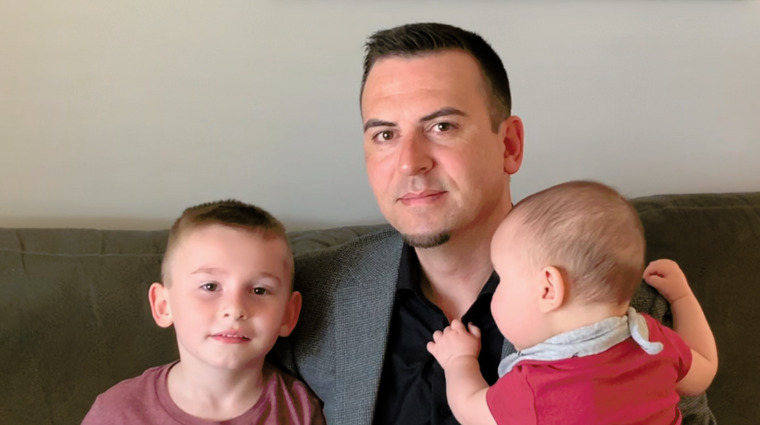
Today is Bell Let’s Talk Day. For Saskatchewan Polytechnic Health and Safety manager Lee Pearce, talking about mental health isn’t something he used to do. Pearce, who has been heading up Health and Safety for the Moose Jaw and Regina campuses since 2016, is a steamfitter/pipefitter by trade and worked in mining before moving to Sask Polytech. “I transitioned from my trade to a health and safety role when I worked at a mine site. Back then my work responsibilities were more focused on working with the different trades and making sure they had the tools and information to keep themselves safe on a daily basis, as well as ensuring regulations were understood and followed.”
In recent years, Pearce has become more aware of the important role that mental health plays in overall health. “Making this a safe place to work and learn isn’t just about following WHMIS guidelines or ergonomic best practices. The psychological aspect of health and safety is also important,” says Pearce.
Pearce learned this firsthand when his own mental struggles forced him to seek help. Like many people dealing with anxiety for the first time, he attributed early stressful episodes to life events—heartbreak, not having a reliable car—things that he could explain. Ex-NHL goaltender Corey Hirsch, who presented a virtual keynote address at Sask Polytech’s recent Wellness Week, spoke about struggling and persevering through periods of mental unwellness for several years. “Corey’s story really resonated with me,” says Pearce. “He woke up one day and just couldn’t handle whatever was going on anymore. The same thing happened to me. My fiancé recognized it and recommended that I see a doctor.”
The hardest part for Pearce, who was new to Sask Polytech, was asking for help. He recognizes now that it was the first step towards mental wellness. “Making that call to the Employee and Family Assistance Program (EFAP), opening up, it’s hard work.” In his live Zoom event, Hirsch, who is now an active advocate for mental wellness and ending the stigma of mental health, encouraged his audience not to be ashamed for seeking help, and if that help is taking medication for a short time or a long time, people should realize that they are strong for taking steps to take care of themselves. Pearce agrees, adding, “Don’t be ashamed for taking care of yourself. You need to find what works for you.”
Pearce points to medical professionals and counsellors as important resources. At Sask Polytech, professional counselling is accessible to both students and employees. Students can connect with Counselling Services in-person, by phone or Zoom. Employees can access counselling through the EFAP’s Homewood Health. Both offer free, confidential service.
Pearce is quick to point out that being honest and opening up about what you’re going through is a step towards wellness. “People are more understanding than we give them credit for, and the connection that can come from sharing the burden of mental health concerns is healing in itself.” Pearce felt lucky to have understanding co-workers and an empathetic manager.
Students, especially those attending post-secondary education for the first time, need to actively seek supports for all kinds of things, including wellness. “That’s why Fitness and Recreation Services includes more than just sports,” says Wellness coordinator Amanda Powers. Aaron Tootoosis, Indigenous student advisor at the Sask Polytech Regina campus, speaks of the holistic nature of Sask Polytech’s Indigenous supports. “We offer all kinds of services aimed at creating connection and inner wellness—from smudging, elder connection, sharing circles and other supports that connect the mind and body.”
Asking for help and finding community are important first steps in any mental wellness checklist. Pearce also discovered that once you’ve taken these steps, there’s a lot of learning ahead. “The hardest part is realizing that you’ve gotten to a place where you’re not in a good state to fix yourself easily. It’s going to take work and time and dedication. Once you realize that, though,” says Pearce, “you have so many options.”
For Pearce, those options have taken him on a journey of self-awareness and better overall health, with exploration into meditation and living in the present, and lifestyle changes that focus on sleep, healthy eating and exercise. “Learning about your condition and how your brain works are an important part of figuring out the root causes of what you’re going through,” Pearce explains. He points to the wealth of resources students and employees have access to, such as mindfulness videos and reading suggestions on the Mental Health and Wellness page at saskpolytech.ca, and workshops such as The Working Mind series offered through Human Resources.
Today, Pearce talks openly about mental health and wellness. He isn’t afraid to mention it in meetings, and he’s gotten better at asking colleagues and friends how they’re doing—how they’re really doing—and if they need help. “Talking about mental health normalizes it,” says Pearce. “Like Corey Hirsch says, we need to make words like ‘suicide’ not taboo anymore. We need to learn to talk about our mental health.”
To learn more about Sask Polytech’s Bell Let’s Talk Day activities and initiatives, visit our Mental Health and Wellness page.
Published Janurary 2022.

